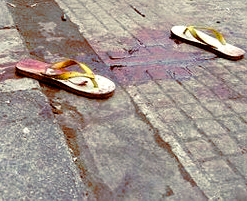Premier slammed for weak stance and alcohol inaction
 ** UPDATE 21/01 - Barry O'Farrell has unveiled new 'one punch laws' for NSW, including lockouts, a freeze on new licences, the statewide closure of bottle shops at 10:00pm and mandatory eight year sentences for fatal alcohol-fuelled one-punch assaults **
** UPDATE 21/01 - Barry O'Farrell has unveiled new 'one punch laws' for NSW, including lockouts, a freeze on new licences, the statewide closure of bottle shops at 10:00pm and mandatory eight year sentences for fatal alcohol-fuelled one-punch assaults **
The New South Wales Premier has been strongly criticised for favouring his own anecdotal evidence over the weight of scientific studies into alcohol-fuelled violence and policy.
Premier Barry O'Farrell has been accused of parroting the line touted by the Australian Hotels Association, which has said that lock-outs and early closing times would do “absolutely nothing to help” and “flies in the face of common sense”.
In a radio interview last week Mr O’Farrell appeared to follow that line, saying; “The slogan put forward by my opponents of 1am lockouts, of 3am shut-outs, is of no comfort to someone who was assaulted just after 9pm.”
“Of course, Thomas Kelly 18 months ago was killed at the Cross at 10.30 at night.”
The New South Wales State Government is expected sometime this week to announce tangible measures to combat the long-term issues of drinking and fighting.
The author of a comprehensive five-year study comparing a range of alcohol policies and effects says the Premier should not base his stance on the timing of two single events.
“It's just a terrible argument,” says Deakin University Associate Professor Peter Miller.
“What sort of premier says it wouldn't have changed these two single incidents?” he asked.
He says evidence has shown that for the whole population, good alcohol policy can have a clearly marked effect.
“Of course you can't guarantee that specific cases wouldn't have happened but the evidence is that people are in the pubs a lot earlier, not out on the streets, when you have earlier closing times.”
Miller authored the Deakin study titled ‘Dealing with alcohol-related harm and the night-time economy’, which spoke to thousands of drinkers and assessed years worth of data comparing Newcastle, which has compulsory closing times and lock-out, against Geelong with its voluntary measures.
Comparative stats showed a higher percentage of drinkers would “pre-load” on alcohol in Geelong, where closures and lock-outs were non-compulsory. The study showed those who “pre-load” are twice as likely to engage in violence.
Several charities, public figures and media outlets are pushing for measures to try and stem the alcohol-fuelled violence that has recently claimed several lives in Sydney, but there appears not to be any movements yet from within the state government.







 Print
Print